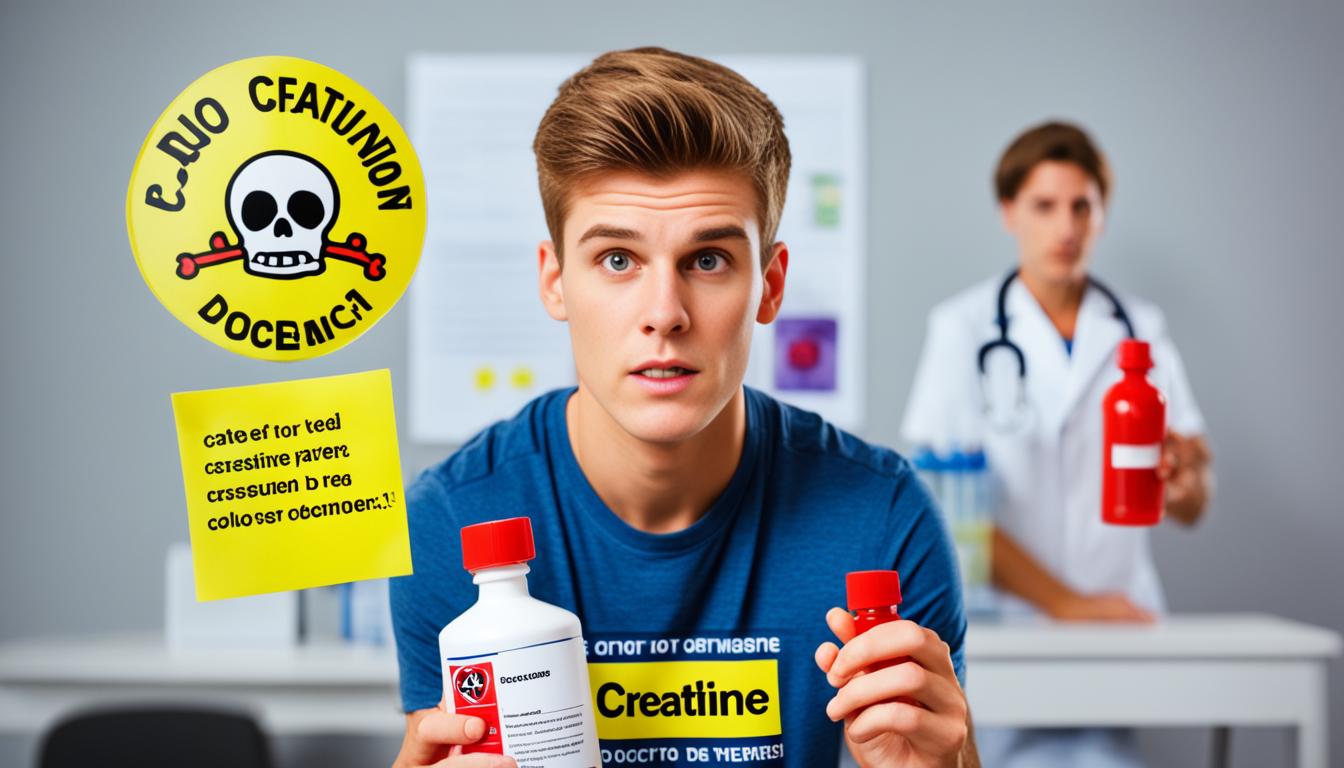Is Creatine Safe for Teens? Know the Facts
Creatine is a nonessential amino acid that is commonly used as a supplement by athletes, including teenagers. It is known for its potential to enhance short bursts of high-intensity athletic performance. However, the safety of creatine for teenagers has been a subject of debate and concern.
The American Academy of Pediatrics and American Society of Sports Medicine do not recommend creatine use for individuals under the age of 18. This is primarily due to a lack of long-term studies on its effects on young athletes. While creatine is generally considered safe when used properly, it is important to be aware of the potential risks and side effects associated with its use.
Key Takeaways:
- The American Academy of Pediatrics and American Society of Sports Medicine do not recommend the use of creatine for individuals under the age of 18.
- Creatine can have side effects such as muscle cramps, dehydration, diarrhea, nausea, and seizures.
- Long-term effects of creatine use in teenagers are still unclear.
- Proper nutrition, rest, and training should be prioritized before considering creatine supplementation.
- Open and informed discussions between parents and teenagers are important in making decisions about creatine use.
What is Creatine and How Does it Work?

Creatine supplementation for adolescent athletes
Creatine is a nonessential amino acid that is naturally produced in the body and can also be taken as a supplement in the form of a powder. It is commonly used by teenage athletes to enhance athletic performance, particularly in activities that require short bursts of intense exercise.
Benefits of creatine for teenage athletes
Creatine works by increasing the energy available for muscle contractions, allowing athletes to perform at a higher intensity for a short duration. It is especially beneficial for high-intensity activities like weightlifting, sprinting, and powerlifting.
Creatine use in young athletes
However, it is important to note that the long-term effects of creatine on young athletes are still unclear. Organizations like the American Academy of Pediatrics do not recommend the use of creatine supplements for individuals under the age of 18 due to a lack of research on its safety and effectiveness in this age group.
Despite the popularity of creatine supplementation among teenage athletes, it is crucial to approach its use with caution and consult with healthcare professionals before making any decisions. It is essential to prioritize the overall health and well-being of young athletes and consider alternative methods to improve athletic performance, such as proper nutrition, rest, and training.
Potential Risks of Creatine for Teens

While creatine is generally considered safe when used at appropriate doses, it is essential for teenagers and their parents to be aware of the potential risks and safety concerns associated with its use.
Dehydration: One concern with creatine supplementation is the possibility of dehydration. Creatine causes muscles to retain water, which can lead to increased fluid needs. Teenagers who use creatine should ensure they are adequately hydrated by drinking enough water throughout the day.
Muscle cramps, diarrhea, and nausea: Long-term use of creatine supplements may result in side effects such as muscle cramps, diarrhea, and nausea. These symptoms can cause discomfort and impact athletic performance. It is important for teenagers to monitor their response to creatine and discontinue use if these side effects occur.
Seizures: In rare cases, creatine supplementation has been associated with seizures. Teenagers who have a history of seizures or are at a higher risk for seizures should avoid using creatine.
Kidney damage: There is a potential for kidney damage with the use of creatine, especially in individuals who are already at risk for kidney dysfunction. Teenagers with existing kidney issues or a family history of kidney problems should exercise caution and consult with a healthcare professional before considering creatine supplementation.
It is crucial for teenagers and their parents to thoroughly research and understand the potential risks and safety concerns of creatine before incorporating it into their athletic routine. Open communication with a healthcare professional can provide further guidance in making informed decisions about creatine supplementation.
Expert Opinion:
“While creatine can be safe and effective for some individuals, there are potential risks associated with its use, particularly for teenagers. The long-term effects of creatine supplementation on a developing body are still not well understood, and caution should be exercised. It is essential to prioritize the overall health and well-being of young athletes and consider alternatives before turning to supplements with potential risks.”
– Dr. Sarah Thompson, Pediatric Sports Medicine Specialist
Benefits of Creatine for Teenagers
When it comes to high-intensity activities, creatine has shown promising benefits for athletes, including teenagers. This supplement has been found to increase the availability of energy for muscle contractions, allowing athletes to perform at a higher intensity and potentially improving their overall performance.
Creatine supplementation is particularly beneficial for activities that require short bursts of intense exercise, such as weightlifting, sprinting, and powerlifting. By providing the muscles with a readily available source of energy, creatine can help athletes push their limits and achieve better results.
Additionally, creatine has been associated with an increase in lean muscle mass. This can be advantageous for teenagers who are looking to enhance their physique and build strength. However, it’s important to note that most research on the benefits of creatine has been conducted on adults, and there is limited specific research on the benefits for teenagers.
| Benefits of Creatine for Teenagers | Description |
|---|---|
| Increased energy availability | Creatine provides the muscles with a readily available source of energy, allowing athletes to perform at a higher intensity. |
| Improved performance | By increasing energy levels, creatine supplementation can potentially enhance overall performance in high-intensity activities. |
| Increase in lean muscle mass | Creatine has been associated with an increase in lean muscle mass, which can be beneficial for teenagers aiming to build strength and improve their physique. |
While the benefits of creatine for teenagers are promising, it’s important to consider individual circumstances and consult with a healthcare professional before starting any supplementation regimen. Teenagers should prioritize proper nutrition, training, and rest as the foundation for their athletic performance, and supplements like creatine should only be considered as an addition to an already well-rounded approach.
Liquid IV and Hydration for Teen Athletes
Liquid IV is a popular electrolyte powder used by athletes, including teenage athletes, to improve hydration. It offers a unique combination of electrolytes, glucose, and water that works more effectively than plain water alone. This is especially important for young athletes who engage in strenuous physical activities and need to replenish their electrolyte levels.
Electrolyte drinks, like Liquid IV, are generally considered safe for teenagers. However, it is important to avoid products that contain caffeine, as caffeine can have adverse effects on hydration. Instead, opt for caffeine-free options to ensure optimal hydration levels.
While electrolyte drinks can be beneficial for athletes participating in prolonged exercise, they may not be necessary for shorter workout sessions or less intense physical activities. In such cases, it is recommended to supplement water intake with foods that naturally contain electrolytes, such as fruits and vegetables. This can provide a more balanced approach to hydration, meeting the body’s needs without relying solely on supplements.
Proper hydration is vital for young athletes to perform at their best and avoid complications related to dehydration. Liquid IV can be a valuable tool in supporting hydration, but it should be used in conjunction with a well-balanced diet and proper hydration practices.
The Benefits of Liquid IV:
- Enhances hydration more quickly than water alone.
- Provides a balanced combination of electrolytes, glucose, and water.
- Aids in replenishing electrolyte levels during and after intense physical activity.
- Available in a range of flavors to suit individual preferences.
Proper hydration is key for teen athletes. Liquid IV offers a convenient and effective way to optimize hydration levels during intense workouts.
Considerations for Teens Taking Supplements
Before considering supplements like creatine, it is important for teenage athletes and their parents to carefully evaluate a few crucial factors. Firstly, it is essential to prioritize the basics, such as proper nutrition, rest, recovery, and adequate training, before turning to supplements. While supplements can offer benefits, they should never replace the hard work and effort required for optimal athletic performance.
One important consideration is to review supplements with a knowledgeable healthcare provider who can provide guidance on their safety and appropriateness for teenage athletes. A healthcare professional can help determine the right creatine dosage for teenage athletes and address any concerns or questions. This step ensures that the supplement is suitable for the individual’s specific needs and health status, minimizing potential risks.
Furthermore, teenage athletes should be aware of the pros and cons of creatine for teens. While creatine supplementation has been shown to have benefits for certain types of high-intensity activities, it may not be necessary for all athletes or sports. Teenagers and their parents should weigh these factors carefully, considering the specific goals and demands of the athlete’s sport.
Pros of Creatine for Teens:
- Enhanced performance in short-duration, high-intensity activities like weightlifting and sprinting
- Potential increase in lean muscle mass
Cons of Creatine for Teens:
- Potential side effects such as muscle cramps, dehydration, diarrhea, nausea, and seizures
- Possible impairment of performance in endurance activities
Lastly, teenage athletes should be familiar with the regulations and guidelines of their respective sports organizations. They should check the ingredients of any supplements they consider taking against the banned substance list to ensure compliance and avoid any unintentional violations that may jeopardize their athletic careers.
When making decisions about creatine and other supplements, it is crucial for teenage athletes and their parents to prioritize open and informed discussions. By considering these important factors and seeking reliable information, they can make well-informed decisions that prioritize not only athletic performance but also the overall health and well-being of teenage athletes.
The Importance of Proper Nutrition for Teen Athletes
While supplements may be tempting for teenage athletes, it is important to prioritize proper nutrition as the foundation for optimal athletic performance. A healthy and balanced diet that includes a variety of foods can provide all the necessary nutrients for young athletes. This includes vitamins, minerals, protein, and carbohydrates.
| Nutrient | Role | Sources |
|---|---|---|
| Calcium | Supports bone health and strength | Dairy products (milk, yogurt, cheese), leafy green vegetables, fortified plant-based milks |
| Iron | Carries oxygen throughout the body | Lean meats, poultry, fish, beans, lentils, tofu, fortified cereals |
| Protein | Builds and repairs muscles | Lean meats, poultry, fish, eggs, dairy products, legumes, nuts, seeds |
| Carbohydrates | Provides energy for physical activity | Whole-grain foods (bread, pasta, rice), fruits, vegetables |
It is recommended to focus on whole-grain foods, lean proteins, fruits, vegetables, and dairy products to ensure adequate nutrition for athletic performance.
The Role of Parents in Educating Teen Athletes about Creatine
As parents, it is crucial to have open and honest conversations with teenage athletes about the use of creatine and other supplements. Educating them about the potential risks and benefits, as well as the lack of long-term studies, can help them make informed decisions. It is important to listen to their feelings and concerns while also providing accurate information and helping them think critically about the claims made by supplement manufacturers. Encouraging teenagers to prioritize their health and well-being over winning at any cost is essential in guiding their choices.
Reliable Resources for Teen Athletes
When it comes to finding reliable information about creatine and other health and wellness topics for teen athletes, it’s important to turn to reputable online sources. These websites provide evidence-based information that can help athletes and their parents make informed decisions and understand the potential risks and benefits of supplements like creatine.
Here are three reliable resources for teen athletes:
- Healthychildren.org: This website, run by the American Academy of Pediatrics, offers a wealth of information on various health topics, including sports nutrition and supplement use. Teen athletes can find trustworthy advice and guidelines to support their overall well-being.
- Medlineplus.gov/teenhealth: MedlinePlus, a service of the U.S. National Library of Medicine, provides reliable and up-to-date health information for teenagers. The Teen Health section covers a wide range of topics, including nutrition, physical activity, and supplements.
- Familydoctor.org: Operated by the American Academy of Family Physicians, this website offers comprehensive information on various health issues. Teen athletes and their parents can find resources on sports nutrition, supplement safety, and overall well-being.
Remember, it’s important for young athletes to research and critically evaluate the information they find. By using these reliable resources, teen athletes can gain knowledge and make informed decisions to support their performance and long-term health.
For teenage athletes, reliable resources are key to making informed decisions. Encouraging them to seek out trustworthy information from reputable sources can help them navigate the complex world of sports nutrition and supplementation. By providing them with the tools they need to make educated choices, you can help them optimize their athletic performance while prioritizing their well-being.
Conclusion
While the potential benefits of creatine supplementation for teenage athletes engaging in high-intensity activities are recognized, it is important to consider the safety and long-term effects. Organizations such as the American Academy of Pediatrics and the American College of Sports Medicine caution against the use of creatine by individuals under the age of 18, primarily due to the lack of comprehensive research in this age group. Prioritizing proper nutrition, rest, and training should be the foundation before considering any supplements.
Teenagers and their parents should engage in open and informed discussions about creatine and other supplements. Understanding the uncertainties surrounding the safety of creatine and the potential risks involved can help guide informed decision-making. It is essential to emphasize the importance of overall health and well-being in the pursuit of athletic performance.
It is recommended that teenage athletes consult with a knowledgeable healthcare provider before considering any supplements. Creating a comprehensive plan that includes appropriate nutrition, training, and recovery strategies is crucial. By prioritizing these aspects and staying informed, young athletes can make decisions that support their long-term health and athletic goals.
FAQ
Is creatine safe for teens?
The safety of creatine for teenagers is still uncertain, and organizations like the American Academy of Pediatrics do not recommend its use for individuals under the age of 18.
What is creatine and how does it work?
Creatine is a nonessential amino acid that is naturally produced in the body and can also be taken as a supplement. It works by increasing the energy available for muscle contractions, enhancing athletic performance in activities that require short bursts of intense exercise.
What are the potential risks of creatine for teens?
Potential risks of creatine for teenagers include muscle cramps, dehydration, diarrhea, nausea, seizures, and the potential for kidney damage, especially in individuals at risk for kidney dysfunction.
What are the benefits of creatine for teenagers?
Creatine has been shown to improve performance in high-intensity activities such as weightlifting, sprinting, and powerlifting. It may also lead to an increase in lean muscle mass.
What is Liquid IV and how does it help with hydration for teen athletes?
Liquid IV is an electrolyte powder that can enhance hydration. It provides a specific ratio of electrolytes, glucose, and water designed to hydrate more quickly than water alone. However, it is important to note that electrolyte drinks may not be necessary for shorter bouts of exercise.
What should teenagers consider before taking supplements like creatine?
Before considering supplements, teenagers should evaluate their nutrition, rest, recovery, and training. They should also consult with a knowledgeable healthcare provider to ensure the supplements are safe and appropriate for them. Checking the ingredients of supplements against the banned substance list for their respective sports organizations is also recommended.
How important is proper nutrition for teen athletes?
Proper nutrition is crucial for teen athletes. A healthy and balanced diet that includes a variety of foods can provide all the necessary nutrients for optimal athletic performance. Nutrients like vitamins, minerals, protein, carbohydrates, calcium, and iron play key roles in supporting athletic performance.
What is the role of parents in educating teen athletes about creatine?
Parents play a crucial role in educating teen athletes about creatine and other supplements. They should have open and honest conversations, providing accurate information about the potential risks and benefits. Encouraging critical thinking and prioritizing health and well-being over winning at any cost is essential.
Where can teen athletes find reliable resources for information about creatine and other topics related to health and wellness?
Teen athletes can find reliable information about creatine and other health topics from reputable online sources such as Healthychildren.org, Medlineplus.gov/teenhealth, and Familydoctor.org. Researching and critically evaluating information can help them make informed decisions.
Is creatine safe for teens? What are the overall conclusions?
The safety of creatine for teens is still uncertain, and organizations like the American Academy of Pediatrics do not recommend its use for individuals under 18. Teen athletes and parents should prioritize proper nutrition, rest, and training before considering supplements. Open and informed discussions can help guide their decisions and ensure overall health and well-being.







